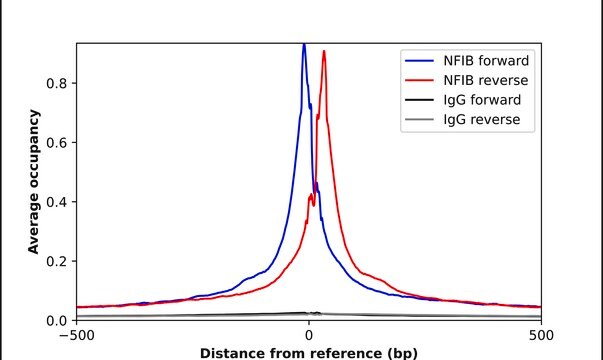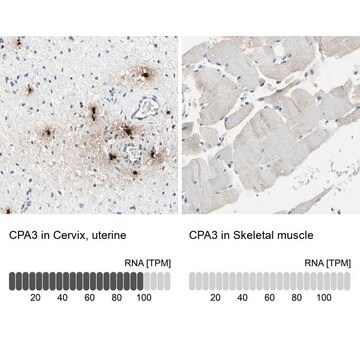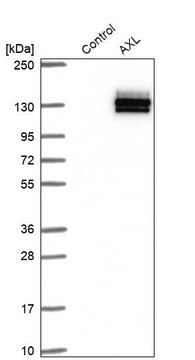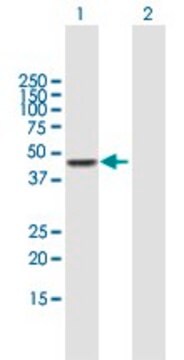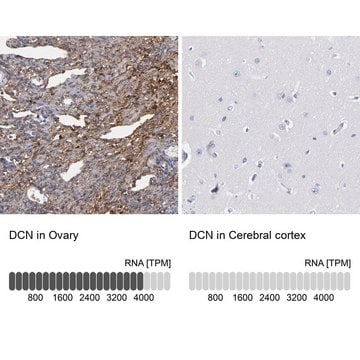추천 제품
생물학적 소스
rabbit
Quality Level
결합
unconjugated
항체 형태
affinity isolated antibody
항체 생산 유형
primary antibodies
클론
polyclonal
양식
buffered aqueous glycerol solution
종 반응성
human
향상된 검증
recombinant expression
independent
orthogonal RNAseq
Learn more about Antibody Enhanced Validation
기술
immunohistochemistry: 1:1000-1:2500
면역원 서열
RFDREKVFRVKPQDEKQADIIKDLAKTNELDFWYPGATHHVAANMMVDFRVSEKESQAIQSALDQNKMHYEILIHDLQEEIEKQFDVKEDIPGRHSYAKYNNWEKIVAWTEKMMDKYPEMVSRIKIGSTVEDNPLYVLKIGEKNER
UniProt 수납 번호
배송 상태
wet ice
저장 온도
−20°C
타겟 번역 후 변형
unmodified
유전자 정보
human ... CPA3(1359)
유사한 제품을 찾으십니까? 방문 제품 비교 안내
일반 설명
CPA3 (carboxypeptidase A3) forms a major component of mast cell secretory granules. It is a zinc-dependent metalloprotease. This gene is localized to human chromosome 3q24.
면역원
Mast cell carboxypeptidase A precursor recombinant protein epitope signature tag (PrEST)
애플리케이션
All Prestige Antibodies Powered by Atlas Antibodies are developed and validated by the Human Protein Atlas (HPA) project and as a result, are supported by the most extensive characterization in the industry.
The Human Protein Atlas project can be subdivided into three efforts: Human Tissue Atlas, Cancer Atlas, and Human Cell Atlas. The antibodies that have been generated in support of the Tissue and Cancer Atlas projects have been tested by immunohistochemistry against hundreds of normal and disease tissues and through the recent efforts of the Human Cell Atlas project, many have been characterized by immunofluorescence to map the human proteome not only at the tissue level but now at the subcellular level. These images and the collection of this vast data set can be viewed on the Human Protein Atlas (HPA) site by clicking on the Image Gallery link. We also provide Prestige Antibodies® protocols and other useful information.
The Human Protein Atlas project can be subdivided into three efforts: Human Tissue Atlas, Cancer Atlas, and Human Cell Atlas. The antibodies that have been generated in support of the Tissue and Cancer Atlas projects have been tested by immunohistochemistry against hundreds of normal and disease tissues and through the recent efforts of the Human Cell Atlas project, many have been characterized by immunofluorescence to map the human proteome not only at the tissue level but now at the subcellular level. These images and the collection of this vast data set can be viewed on the Human Protein Atlas (HPA) site by clicking on the Image Gallery link. We also provide Prestige Antibodies® protocols and other useful information.
생화학적/생리학적 작용
CPA3 (carboxypeptidase A3) is responsible for the detoxification of snake and bee venoms. In septic peritonitis, this enzyme reduces the systemic toxicity of endothelin and neurotensin, which are endogenous peptides. It acts as a marker of mast cells and their activity, and its levels are increased in patients with chronic prostatitis/chronic pelvic pain syndrome (CP/CPPS).
특징 및 장점
Prestige Antibodies® are highly characterized and extensively validated antibodies with the added benefit of all available characterization data for each target being accessible via the Human Protein Atlas portal linked just below the product name at the top of this page. The uniqueness and low cross-reactivity of the Prestige Antibodies® to other proteins are due to a thorough selection of antigen regions, affinity purification, and stringent selection. Prestige antigen controls are available for every corresponding Prestige Antibody and can be found in the linkage section.
Every Prestige Antibody is tested in the following ways:
Every Prestige Antibody is tested in the following ways:
- IHC tissue array of 44 normal human tissues and 20 of the most common cancer type tissues.
- Protein array of 364 human recombinant protein fragments.
결합
Corresponding Antigen APREST70115
물리적 형태
Solution in phosphate-buffered saline, pH 7.2, containing 40% glycerol and 0.02% sodium azide
법적 정보
Prestige Antibodies is a registered trademark of Merck KGaA, Darmstadt, Germany
면책조항
Unless otherwise stated in our catalog or other company documentation accompanying the product(s), our products are intended for research use only and are not to be used for any other purpose, which includes but is not limited to, unauthorized commercial uses, in vitro diagnostic uses, ex vivo or in vivo therapeutic uses or any type of consumption or application to humans or animals.
적합한 제품을 찾을 수 없으신가요?
당사의 제품 선택기 도구.을(를) 시도해 보세요.
Storage Class Code
10 - Combustible liquids
WGK
WGK 1
Flash Point (°F)
Not applicable
Flash Point (°C)
Not applicable
개인 보호 장비
Eyeshields, Gloves, multi-purpose combination respirator cartridge (US)
가장 최신 버전 중 하나를 선택하세요:
Devandir Antonio de Souza Junior et al.
BioMed research international, 2015, 142359-142359 (2015-07-07)
An association between mast cells and tumor angiogenesis is known to exist, but the exact role that mast cells play in this process is still unclear. It is thought that the mediators released by mast cells are important in neovascularization.
George H Caughey
Advances in experimental medicine and biology, 716, 212-234 (2011-06-30)
Proteases are the most abundant class of proteins produced by mast cells. Many of these are stored in membrane-enclosed intracellular granules until liberated by degranulating stimuli, which include cross-linking of high affinity IgE receptor F(c)εRI by IgE bound to multivalent
Tryptase-PAR2 axis in experimental autoimmune prostatitis, a model for chronic pelvic pain syndrome.
Kenny Roman et al.
Pain, 155(7), 1328-1338 (2014-04-15)
Chronic prostatitis/chronic pelvic pain syndrome (CP/CPPS) affects up to 15% of the male population and is characterized by pelvic pain. Mast cells are implicated in the murine experimental autoimmune prostatitis (EAP) model as key to chronic pelvic pain development. The
Gunnar Pejler et al.
Trends in immunology, 30(8), 401-408 (2009-08-01)
When mast cells are activated they can respond by releasing their secretory granule compounds, including mast cell-specific proteases of chymase, tryptase and carboxypeptidase A (MC-CPA) type. MC-CPA is a dominant protein component of the mast cell granule and the MC-CPA
M M Dikov et al.
The Journal of biological chemistry, 269(41), 25897-25904 (1994-10-14)
By cDNA sequence analyses the proteases found within the secretory granules of immune/inflammatory cells appear to be translated initially as zymogens, but by amino-terminal sequencing they are stored within the granules in an active form. We now show that murine
자사의 과학자팀은 생명 과학, 재료 과학, 화학 합성, 크로마토그래피, 분석 및 기타 많은 영역을 포함한 모든 과학 분야에 경험이 있습니다..
고객지원팀으로 연락바랍니다.
